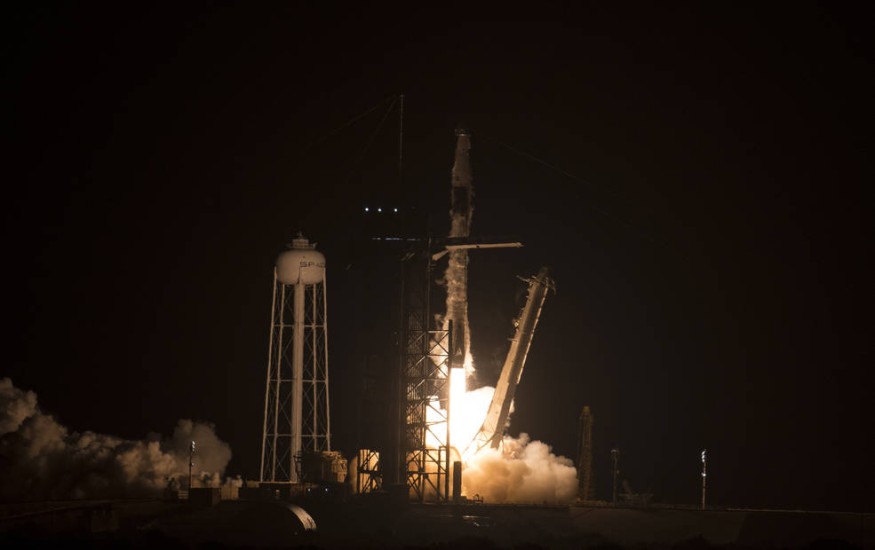Four new astronauts arrived at the International Space Station (ISS) aboard a SpaceX Crew Dragon spacecraft. NASA astronauts Kjell Lindgren, Bob Hines, Jessica Watkins, and Samantha Cristoforetti of the European Space Agency were on board the Crew Dragon.
NASA said the four astronauts launched from Launch Complex 39A at NASA's Kennedy Space Center in Florida at 3:52 a.m. ET on Wednesday, April 27. The crew arrived at the space station at 9:15 a.m. ET later that morning.

A SpaceX Falcon 9 rocket carrying the company's Crew Dragon spacecraft is launched on NASA’s SpaceX Crew-4 mission to the International Space Station with NASA astronauts Kjell Lindgren, Robert Hines, Jessica Watkins, and ESA (European Space Agency) astronaut Samantha Cristoforetti onboard, Wednesday, April 27, 2022, at NASA’s Kennedy Space Center in Florida.
SpaceX Crew Dragon Successfully Undocks Astronauts in ISS
SpaceX has released a video that shows the Crew Dragon's Draco engines guiding the spaceship toward the International Space Station (ISS).
The automated move took place on April 27. It heralded the arrival of SpaceX's Crew-4 astronauts at the orbiting outpost after a 16-hour journey from Florida's Kennedy Space Center.
"The Dragon spacecraft is equipped with 16 Draco thrusters used to orient the spacecraft during the mission, including apogee/perigee maneuvers, orbit adjustment and attitude control," SpaceX says on its website (per Digital Trends).
Video of Dragon’s Draco thrusters moving the spacecraft closer to the @Space_Station pic.twitter.com/0zBNYgAcDb
— SpaceX (@SpaceX) April 28, 2022
The crew named the spacecraft Freedom after successfully docking with the ISS shortly after the footage was captured. The Crew-4 astronauts entered the facility through the connecting hatch later and met the current residents for the first time.
Crew-4's mission will keep the Crew Dragon at the space station for around six months.
The astronauts will then re-enter the capsule and undock, with the Draco engines lighting up once again to assist in safely returning the ship and crew to Earth.
In the event of an emergency immediately after launch, SpaceX's capsule features eight SuperDraco engines capable of shooting the Crew Dragon up to half a mile away from the launch vehicle in less than eight seconds. Although the SuperDraco engines have never been used, SpaceX released spectacular footage of a crewless flight that tested the safety system far above the Atlantic Ocean a few years ago.
Since 2012, the Crew Dragon spacecraft has been transporting cargo to the International Space Station, and crew trips began in 2020.
About Crew-4 Mission
Jessica Watkins and her colleagues will be sent to a crowded space station. Oleg Artemyev and Denis Matveev, two Roscosmos engineers, will execute a spacewalk on Thursday, April 28.
NASA said the astronauts would focus on getting the new European robotic arm connected to the Russian Nauka module to work. The two departed the station at 10:58 a.m. ET will focus on various chores while outside the station, including putting more handrails on the new module, removing thermal blankets and locks from the robotic arm, and monitoring the robotic arm.
Over the next few months, the Crew-4 astronauts will contribute to research aboard the ISS, including work on materials science, health technology, and plant science.
Kathryn Lueders, an associate administrator for NASA's Space Operations Mission Directorate in Washington, said in a statement that NASA, SpaceX, and its international partners have worked relentlessly to guarantee that the International Space Station continues to perform essential research for people.
Because there are presently 11 people on board, space on the ISS will be limited for a few days. This is within the station's capacity, although it's more than a regular staff of four to eight workers.
The four members of the station's Expedition 67 crew who arrived as Crew-3 - NASA's Raja Chari, Thomas Marshburn, Kayla Barron, and ESA's Matthias Maurer - will return home from the station soon, probably on May 4.
What Makes Crew-4 Different From Previous Missions
The current mission made history because it included Jessica Watkins — first Black woman to join the crew of the International Space Station for a prolonged period of time.
Although more than a dozen Black Americans, including four Black women, have traveled to space since Guion Bluford became the first in 1983, CNN said no Black woman has had the opportunity to live and work in space for an extended period. International Space Station has allowed more than 200 astronauts to do since 2000.
She began her career with NASA as an intern, and she has previously worked at NASA's Ames Research Center in Mountain View, California, and the Jet Propulsion Laboratory in Pasadena, California, where she worked on the Curiosity Mars rover. She has researched the surface of Mars as a certified geologist.
Watkins is known among her crew members as "Watty."
RELATED ARTICLE : Rocket Lab to Catch a Scorching Hot Sikorsky S-92 Rocket Booster in the Air Friday [Look]
Check out more news and information on SpaceX in Science Times.










